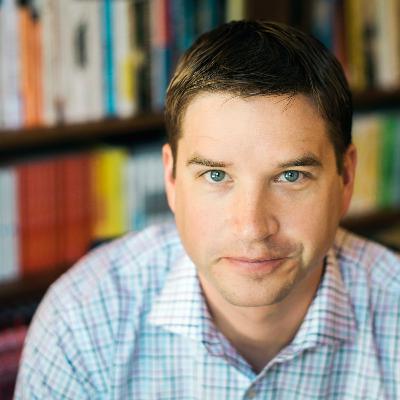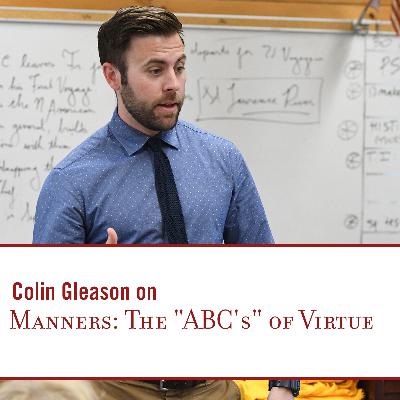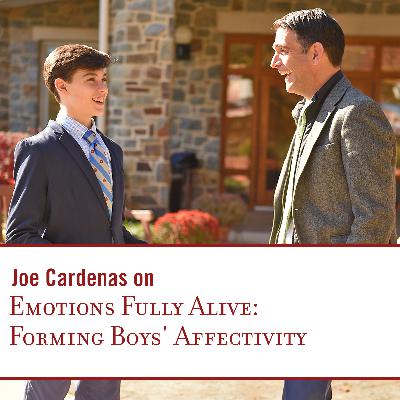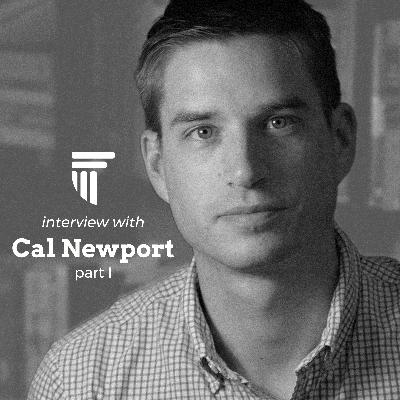Discover HeightsCast: Forming Men Fully Alive
HeightsCast: Forming Men Fully Alive

HeightsCast: Forming Men Fully Alive
Author: The Heights School
Subscribed: 116Played: 5,603Subscribe
Share
© The Heights School
Description
Welcome to HeightsCast, the podcast of The Heights School. With over 200 episodes, HeightsCast discusses the education of young men fully alive in the liberal arts tradition. The program engages teachers and thought-leaders in the educational/cultural space to support our community of listeners: parents, teachers, and school leaders seeking to educate the young men in their care. Instead of downloads, HeightsCast's most important metric for success is the unknown number of thoughtful discussions it prompts in homes, faculty lunchrooms, and communities around the country and the world. Thank you for listening; thank you for continuing the conversation.
279 Episodes
Reverse
In his famous intellectual and spiritual autobiography, Orthodoxy, G.K. Chesterton remarks that the main problem for philosophers is how they can “contrive to be at once astonished at the world and yet at home in it.” The attainment of this double need--for surprise and for security--is, he maintains, at the heart of human happiness. Modernity poses similar questions to educators who, though at home in classical and medieval thought, nevertheless desire to prepare their students to live in the middle of the world. Namely: How can we root our students in those timeless truths, so prized by the ancients and furthered by the medievals, while preparing them to embrace the modern world? How can we form our students to be both contemplative and active, to be comfortable in the country and in the city, so to speak? In Biblical terms: how can we remain in this modern world of ours, and yet not be of it? To help us begin to answer these questions, we welcome to HeightsCast Dr. Daniel Bernardus, a theoretical biologist by training, teacher and tutor at Amsterdam University College by profession, and a philosopher and author by passion. In this episode, Dr. Bernardus introduces us to the ideas of Leonardo Polo, a Spanish philosopher from the University of Navarre, whose work just might offer us a way forward. Can we integrate the modern, the classical, and the Christian? Can we love the modern world and God first? Listen in and see for yourself. Show Highlights Who is Leonardo Polo? How Polo’s philosophy can help educators Can modern philosophy be integrated with classical and Christian thought? What Freedom in Quarantine can teach you The roots of modernism and what they can teach us about the way forward The limits of classical thought How medieval monasteries were places of innovation Can anything good come from modernity? How modern science can harmonize with classical philosophy Consequences of modernism in education What is success? Can we measure it? How technological innovation can be pursued for love of God Why the family is essential to education What Leonardo Polo can teach those who are not educators Suggested Reading Freedom in Quarantine Resources Leonardo Polo Institute of Philosophy
Missed Part I? Click here. Continuing last week’s conversation, in this episode Dr. Newport delves into two things that have become ubiquitous in our lives: texting and email. Whether it is logistical texts with our kids or emails for work, these two technologies can occupy a large portion of our days. Indeed, even a quick text or email can cost us time, as we shift our attention between different contexts. While texting and email may by now feel like second nature, have we ever stopped to think about how best to use these technologies? In addition to tackling these topics, Cal runs through three practices to help us better spend that treasure which is our time: Practice solitude Quit socials to foster authentic conversations Reclaim true leisure To close, Cal offers some words of wisdom to our graduating seniors, as they head off to college. If they can learn to use technology well, in an integrated and intentional way, they will be at a tremendous advantage. Their time will double, their focus sharpen, and--what is more--they’ll form meaningful friendships along the way. Show Highlights The necessity of times of solitude and self-reflection Why you should quit social media and become truly social Reclaim leisure to live more meaningful lives How to integrate texting into a purposeful life What psychology and brain science can teach about texting What the pandemic has shown us about the dual nature of technology The human brain is not a parallel processor and why this matters How companies can better use email to improve workflows The attention capital principle What graduating seniors can learn to make the most of technology in college--and beyond. Suggested Reading Leisure: The Basis of Culture Digital Minimalism A World Without Email Additional Listening Forming Deep Workers, Part I Forming Deep Workers, Part II
For these next two episodes, we welcome back Dr. Cal Newport, professor of computer science at Georgetown University and New York Times bestselling author of seven books, including Digital Minimalism and A World Without Email. In this week’s episode, we will focus on the first of these two books, Digital Minimalism, and how to go about developing a deliberate and purposeful approach to our use of technology. And remember, our children are always watching and learning. In next week’s episode, we’ll dive into a specific application of this philosophy to email and texting as well. But for now, Digital Minimalism. It has been said in other contexts that the choice is not between philosophy and no philosophy, but between good philosophy and bad philosophy; having no philosophy is itself a philosophy, albeit a disastrous one. The same holds true for our philosophy or approach to technology which, although often vital in the modern world, can be dangerous if used mindlessly. In this episode: Learn about the history and psychology of smartphones and social media. Listen to Cal discuss his philosophy of digital minimalism. Hear about the thirty day “digital declutter” and why you should try it for yourselves--maybe even this July? Gain some practical wisdom about implementing the philosophy in your homes including Cal's take on when our sons are ready for their first smart phone. In all, Cal offers us a hopeful view for the future. With the shimmer of novelty beginning to fade, now is the time to think about how to integrate digital technology into our lives and into the lives of our children.
While summer is a time for rest and relaxation, it is also an opportunity for personal growth. Indeed, the increase in external freedom, which the summer months often afford our sons, provides an occasion for growth in interior freedom. In this week's episode, Mr. Joe Cardenas, head of mentoring at The Heights School, discusses how you can help your son make the most of the summer months. To this end, Mr. Cardenas suggests looking at the summer from two perspectives: the bird's eye view and the daily routine. Looking over the summer as a whole--perhaps with a calendar in hand--we can help our sons set goals and make big-picture plans. But goals without effective systems are mere wishes, so we should also encourage our sons to develop a good daily routine that will help him to realize these goals. In particular, Mr. Cardenas suggests five areas for routines: Waking-up and going to bed Reading Life of prayer Physical exercise Acts of service Of course, and as always, encouragement should come in the context of freedom and in an age appropriate manner; we want to help our sons set goals and formulate routines for themselves, not impose our own ideas in an overly rigid manner. One of the great advantages of the summer is, after all, the opportunity for our boys to grow in the use of their freedom. Stay tuned after the podcast for a few other resources that might be helpful as you plan your summer, including a summer-planning guide PDF now available on The Heights Forum. You don’t need to subscribe to anything to get it, we just want to help. Also, join us for a follow-up Q&A webinar with Mr. Joe Cardenas and Mr. Bill Dardis (head of the Heights Internship Program). If you have questions about wake-up times, summer jobs, and chores, bring ‘em by and we’ll discuss. To register for the webinar, visit HeightsForum.org. Show Highlights -How summer can be a time of great personal growth -Two perspectives on the summer: the birds eye view and the daily routine -Ideas on helping your son make use of a calendar -Why increased freedom during the summer is an opportunity for growth in virtue -The importance of systems for success, not just goals -Areas for daily routines: wake-up time, reading plan, life of prayer, physical exercise, service, bed-time -How should parents discuss goals and routines with their son? -Three ways to help your son develop a summer routine: know your son, engage his freedom, share your own goals -Should my son get a job? -Unstructured free time is just as important for older boys as it is for younger boys -Why personal growth is ultimately oriented towards the service of others Suggested Reading Leisure: The Basis of Culture, Josef Pieper Additional Listening Three Components of a Great Lower School Summer Systems for Athletic Success Summer Reading with a Purpose Heights Resources Planning Free Printable Summer Planner PDF Fitness Bodyweight Workout Plan Reading Heights Book Review (A review of contemporary literature for boys) Heights Books (Books read for extra credit at The Heights) Heights Summer Reading Books
What is present in every Platonic dialogue, the subject of one of Cicero’s famous letters, and the kind of relationship Christ wished to have with his twelve apostles and with each of us? It is friendship. From facebook friends to philosophic treaties, 70’s songs to Tennyson poems, we hear about friendship in many different contexts. But what is authentic friendship? How do we foster it? How do we help our children grow in their friendships? And in the end, how do we help them grow in the friendship of all friendships, namely that with Our Lord? In this week’s podcast, David Maxham discusses such questions as these. Based on a talk he recently gave to our senior class, David considers the lofty ideal of friendship and offers practical advice on how to make this ideal a reality. He first discusses why senior year is a fitting time for our students to think more deeply about their relationships, and how a few good friends can make all the difference during their college years (and beyond). He then dives into the importance of admonition and sincerity in authentic friendships, offering insights on the art of amicable correction and the necessity of being vulnerable for forming friendships. Lastly, David turns his attention to how parents can help their children grown in their friendships. As is often the case, here there can be no substitute for practicing what one preaches and patiently preaching what one practices. Show Highlights Why senior year is a fitting moment to discuss friendship What is friendship? Life is a training ground for friendship and growing in love Is this lofty ideal practically possible? The demands of friendship Why one can only have a few good friends in life Admonishing our friends? How to correct with charity and tact Truth is the thing: the importance of sincerity in friendship How our friendships can help us be better friends of Our Lord The importance of patience You have to be a friend (for your children) to have a friend: why modeling good friendships is the best way to help your children grow in their own Resources Alasdair MacIntrye: True friendships are rare, but possible Is Friendship Possible? “We do not really want a religion that is right where we are right. What we want is a religion that is right where we are wrong. We do not want, as the newspapers say, a church that will move with the world. We want a church that will move the world.” ― G. K. Chesterton, Charles Dickens: A Critical Study
Mr. de Vicente concludes this three part series on raising iGen. Given the forces and impact of our digital world and general culture, our headmaster presents considerations and strategies for parents seeking to accompany their sons on the path to Christian Manhood.
Mr. de Vicente continues his discussion of iGen, turning from the protecting, distracting, unsettling forces that have affected our sons to the impact of those forces on their character.
Our headmaster begins a three episode series on iGen. In today's episode, Mr. de Vicente explores the influences and forces that have overprotected, distracted, and unsettled our sons.
In this week's episode Mr. Michael Moynihan discusses an exercise that allows teachers to isolate the relativistic variable in the moral minds of their students. What is relativism? What is the exercise? And why does any of this matter to those of us just trying to live the good life–however you define that? Mr. Moynihan's article available here.
Dr. Jason Baxter, Academic Dean at Wyoming Catholic College and author of The Beginners Guide to Dante's Divine Comedy offers his thoughts on how to introduce students to the Divine Comedy. By forcing the Divine Comedy (and many other "Great Works") on our boys without the proper groundwork, we risk cheating them of a profound encounter. But there is value, and this is an introduction worth making. How do we go about it? Listen in and follow our guide.
Are manners stodgy vestiges of a bygone aristocratic age? At The Heights, we'd offer a resounding "no." Manners matter, and as parents and teachers, these "rules of civility" offer a great opportunity for teaching our boys virtue. Listen in to hear more.
In this episode, Head of Mentoring, Joe Cardenas, explains the importance of training the emotions of our aspiring "men fully alive." Often we see education as a matter of the head; but as teachers, we must be just as concerned with forming the heart. We base much of this interview on this article from OpusDei.org.
As parents, we fight distraction in our lives daily. Our phones tether us to the trivial, and our inability to stay off email for even limited periods of time costs us the rewards and satisfaction of deep work. America’s youth, to an even greater extent, are losing the ability to focus on difficult tasks. This podcast features Cal Newport, author of Deep Work, So Good They Can’t Ignore You, and How to Be a High School Superstar. Dr. Newport, a Computer Science professor at Georgetown University, has a strong following in The Heights community, as his notions of deep work jive perfectly with our attempts to raise contemplative sons and competent professionals. Listen in, both for your son and for yourself. Stay tuned for next week’s episode with Cal on How to Be a High School Superstar, and to learn more about Cal and his work check out his blog at CalNewport.com.
This week on HeightsCast, we are joined by twelfth grade AP English teacher, Mr. Michael Ortiz, who talks about the books he reads with his students. Also featured in this week's poetry segment is Mr. John Paul Lechner, who analyzes a poem by Gerard Manley Hopkins.
In this episode of HeightsCast, Headmaster of The Heights School, Alvaro de Vicente talks about his recent letter to parents on the culture of the home. Also, a poem by Richard Wilbur recited and analyzed by drama teacher, Mr. Joseph Bissex.
This episode of HeightsCast continues last episode's interview with Jackson Scholars' head, Dr. Matthew Mehan, on the Liberal Arts. We use the term almost daily, but what does it mean? And what does it mean for us? Also, we hear two of Gerard Manley Hopkins' poems, one recited and explained by lower school teacher Mr. Tom Longano, and another sung as an arrangement composed by music teacher Mr. Patrick Love.
This episode of HeightsCast features the first half of an interview with Jackson Scholars' head, Dr. Matthew Mehan, on the Liberal Arts. We use the term almost daily, but what does it mean? And what does it mean for us? Also, Mr. Chris Breslin makes a guest appearance sharing a poem with our listening audience.
Mr. Tom Steenson speaks to us about living Advent well, and Mr. Patrick Love dives deep into the music department's selections for this year's Christmas Concert. Tune in to learn what parents and educators can do to better live and hear the true spirit of the season!
Mr. Cardenas joins us this week to talk about helping your son stay grounded in reality.
This week we are joined by Head of Middle School, Andy Reed, who offers his thoughts on the culture of the home, and ways to aid in the development of your son's will.














